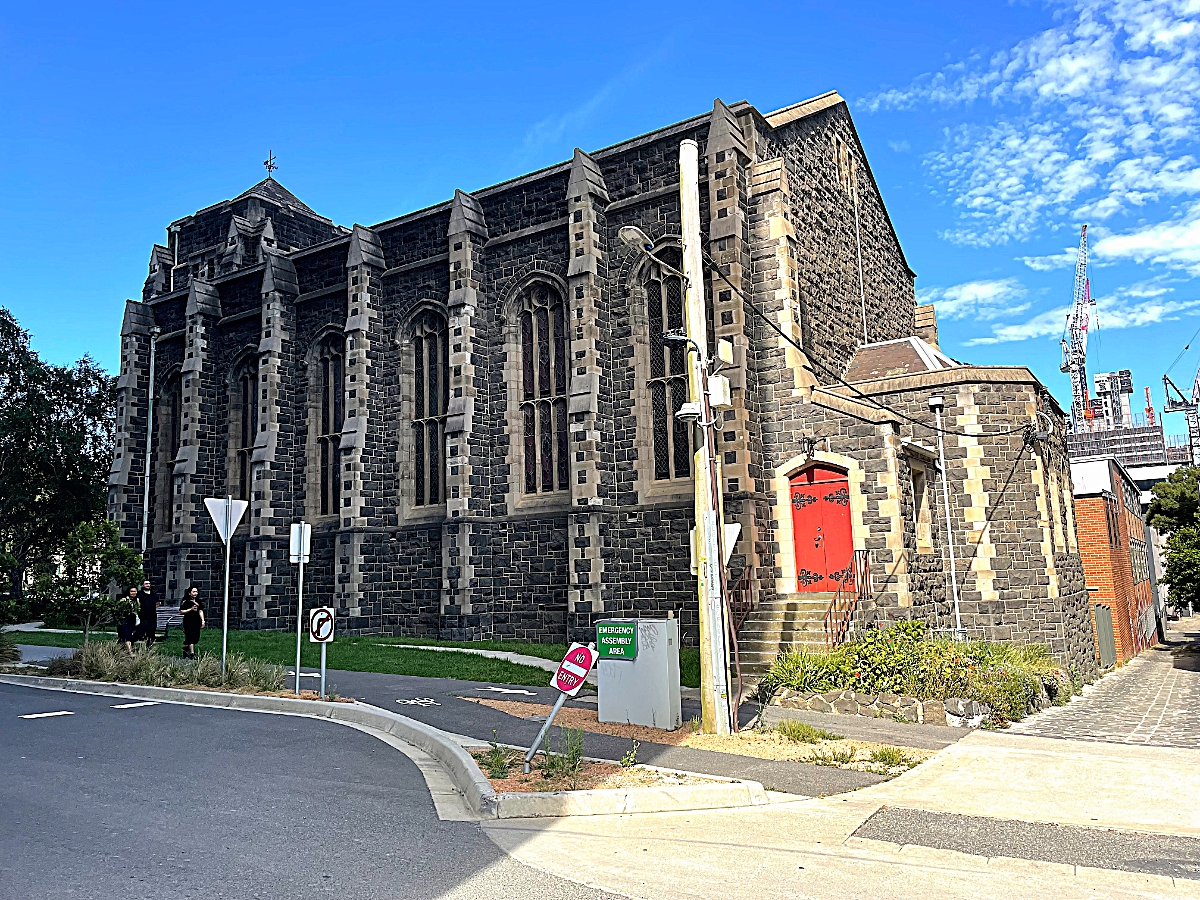
St Andrew’s Uniting Church, Box Hill, exterior from the north-east
[photograph by John Maidment (17 January 2023)]
Historical and Technical Documentation by John Maidment
© OHTA (last updated January 2023)
 St Andrew’s Uniting Church, Box Hill, exterior from the north-east [photograph by John Maidment (17 January 2023)] Historical and Technical Documentation by John Maidment © OHTA (last updated January 2023) |
The church building was originally sited in West Melbourne, at the north-east corner of William and Lonsdale Streets. It was constructed as the West Melbourne Presbyterian Church to the design of architects Smith & Watts. The style was Perpendicular-Gothic and the uncompleted tower was modelled upon that of ‘Boston Stump’, in Lincolnshire, UK. In early 1935 the building was sold to the congregation of St Andrew’s Presbyterian Church, Box Hill. It was carefully dismantled stone by stone and reassembled at Box Hill. The work was supervised by architects John F.D Scarborough, of Scarborough, Robertson & Love, in conjunction with Hugh Craig, of Craig, Reynolds & Garrett.1 The building was shortened by one bay, the tower redesigned and vestries placed on either side of the tower. The original cedar furnishings and stained glass, by Ferguson & Urie, were retained. The foundation stone was laid at Box Hill on 27 April 19352 and the building opened and dedicated on 13 December 1935.3
 West Melbourne Presbyterian Church – the 1882 Fincham organ in its original location [Geo.Fincham & Son organ catalogue, 1901] |
The organ was built in 1882 by George Fincham for the West Melbourne church and was opened on 2 August 1882. With three manuals, 32 speaking stops and four couplers, it was one of Fincham’s largest productions to date, although several of the stops were prepared for later insertion.
| GREAT Double Diapason Open Diapason Horn Diapason Claribel Octave Clear Flute Twelfth Fifteenth Mixture Posaune Swell to Great |
16 8 8 8 4 4 2-2/3 2 3 ranks 8 |
||
| SWELL Double Diapason Geigen Principal Stopped Diapason Keraulophon Gemshorn Wald Flute Piccolo Cornopean Oboe Oboe [Clarion] |
16 8 8 8 4 4 2 8 8 4 |
||
| CHOIR Gedact Gamba Dulciana Angelica Dulcet Harmonic Flute Flautina Clarionet |
8 8 8 8 4 4 2 8 |
TC |
|
| PEDAL Grand Open Diapason Bourdon Principal Bass Flute Great to Pedal Swell to Pedal Choir to Pedal |
16 16 8 8 |
3 composition pedals to Great
3 composition pedals to Swell4
In 1897, George Fincham installed a Cornopean 8 and Clarion 4 on the Swell.5
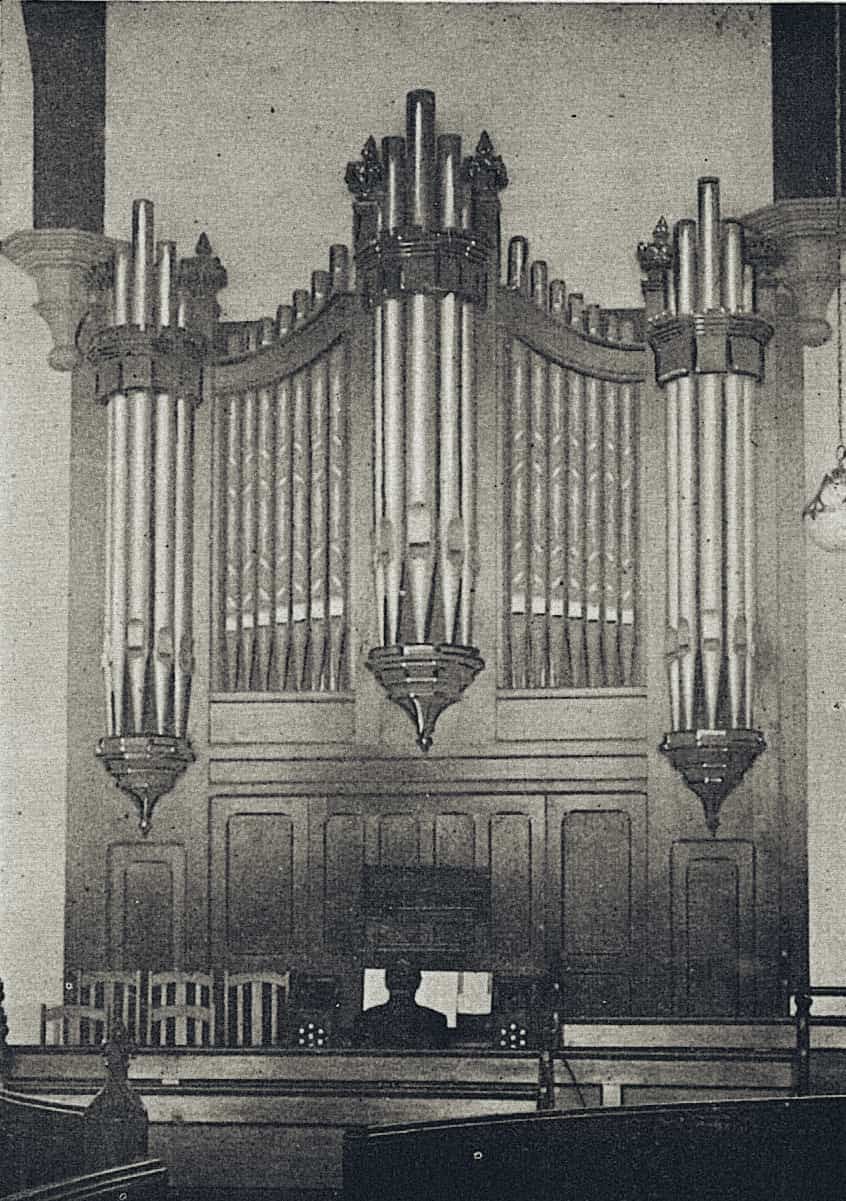 Organ in its current location between 1935 and 1952 [St Andrew’s church history, n.d.] |
The organ was moved to Box Hill in 1935 by Geo.Fincham & Sons Pty Ltd without alteration.
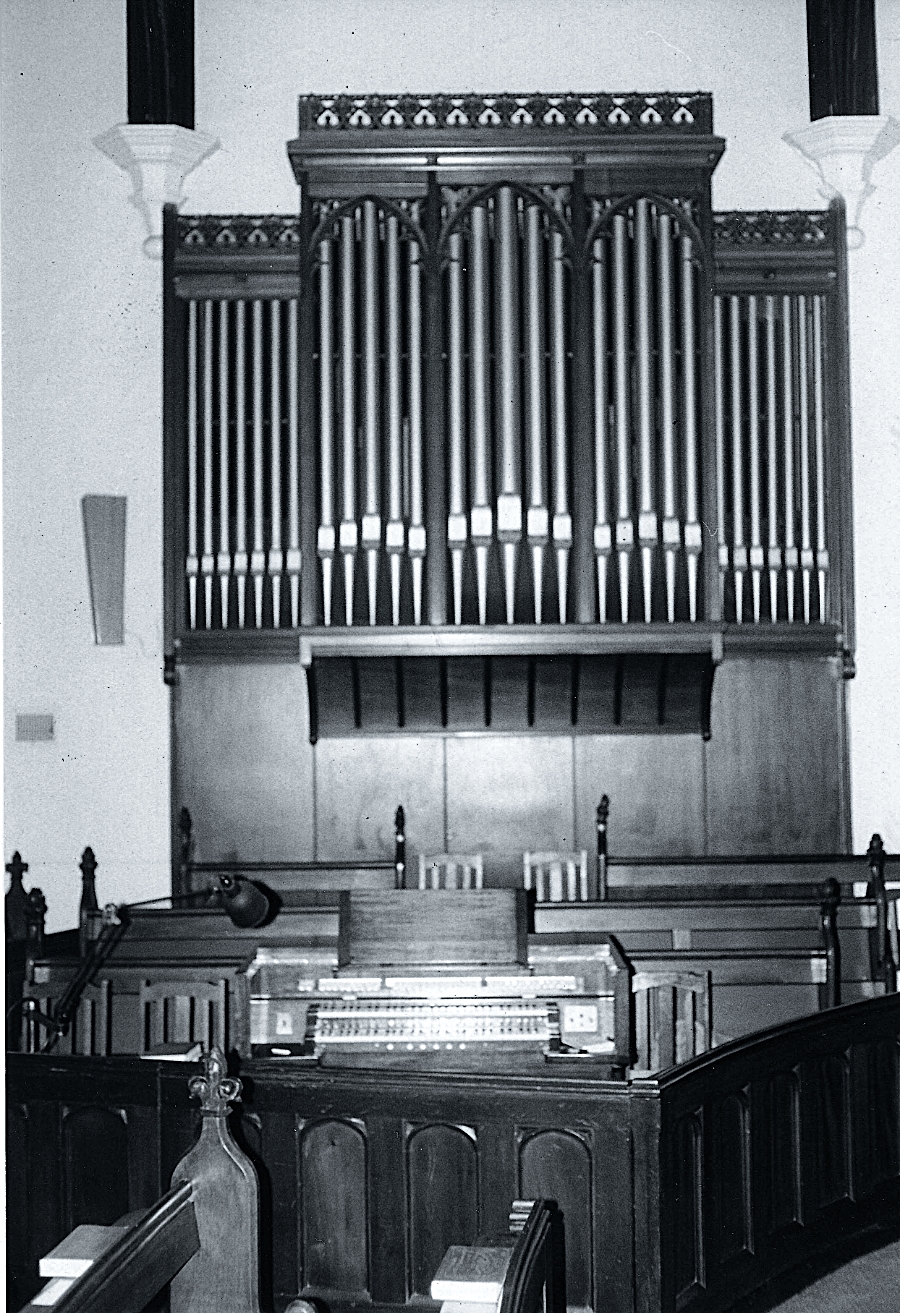 The organ after its rebuilding by Hill, Norman & Beard (Australia) showing the new case [photograph by W.G.S. Smith (c.1970-1980)] |
In 1952, the organ received a major rebuilding by Hill, Norman & Beard (Australia) Pty Ltd. The work included:
• Removal of the Choir Organ (the windchest was used later at St Paul’s Cathedral, Bendigo)
• Introduction of electro-pneumatic key and stop action
• Construction of a new detached stopkey console
• Construction of a new organ case, presumably designed by W.A.F Brodie, the firm’s managing-director
• A number of tonal changes
The specification in 1952 was:
| GREAT Bourdon Open Diapason I Open Diapason II Claribel Flute Dulciana Principal Twelfth Fifteenth Trumpet Swell Sub Octave to Great Swell to Great Swell Octave to Great |
16 8 8 8 8 4 2-2/3 2 8 |
New bass octave, remainder Choir Gedact Old Horn Diapason revoiced Ex Choir, new stopped bass |
|
SWELL |
16 8 8 8 8 4 2 2 ranks 8 8 |
New TC Ex Keraulophon revoiced New Old revised, 17.19, 12.17, 10.12 |
|
| PEDAL Open Diapason Bourdon Bourdon Minor Octave Flute Octave Flute Trombone Great to Pedal Swell to Pedal |
16 16 16 8 8 4 16 |
B C A B C C Prepared for |
Compass: 61/30
Electro-pneumatic key and stop action
Detached stopkey console
Thumb & toe pistons
Balanced swell pedal6
John Parker installed a new Great Mixture 3 ranks in 1982. When the church was receiving a major refurbishment, the console was disconnected and it was not reconnected, so the organ is now unplayable.7
1 Victorian Churches, edited by Miles Lewis. East Melbourne; National Trust of Australia (Victoria), 1991, p.59
2 The Argus, 24 April 1935, p.6
3 The Age, 16 December 1935, p.10
4 Specification from The Argus, 4 August 1883, p.5 with further detail inserted
5 E.N. Matthews, Colonial Organs and Organbuilders (Carlton: Melbourne University Press, 1969), p.156
6 Specification noted by John Maidment with details from the HN&B order records
7 Advised by Australian Pipe Organs Pty Ltd
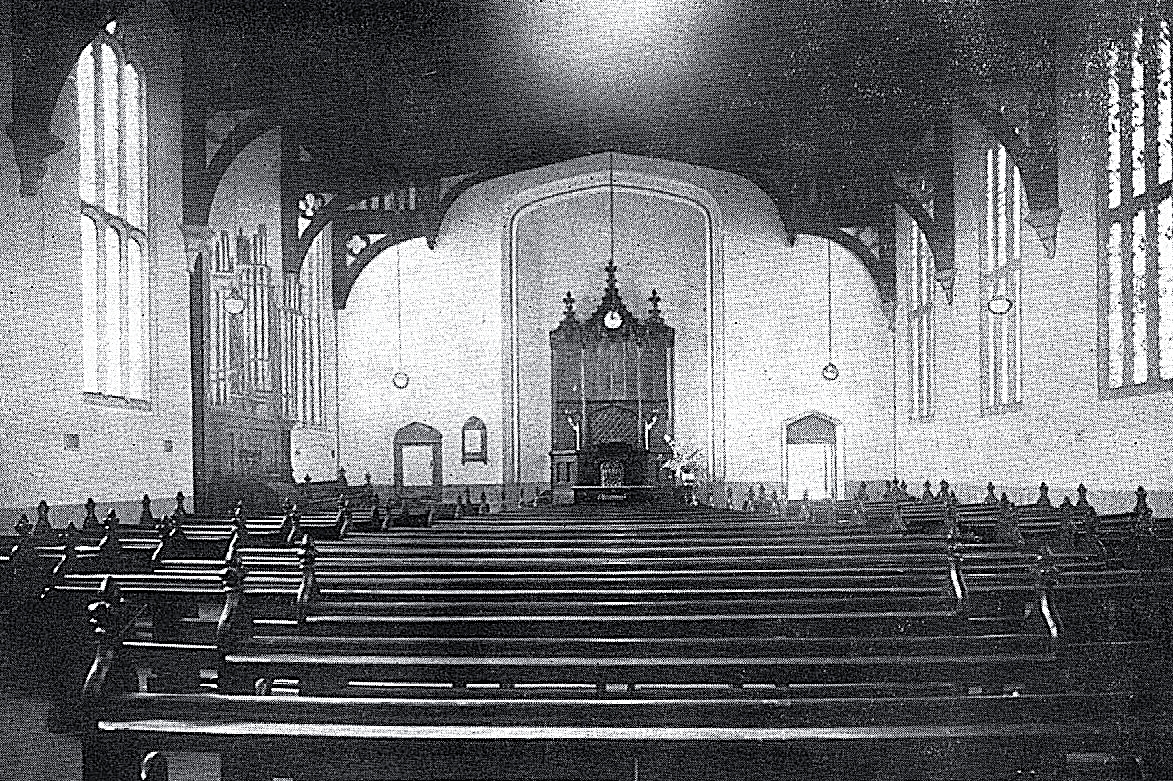 Church interior at Box Hill before the rebuilding of the organ with a new case [St Andrew’s church history, n.d.] 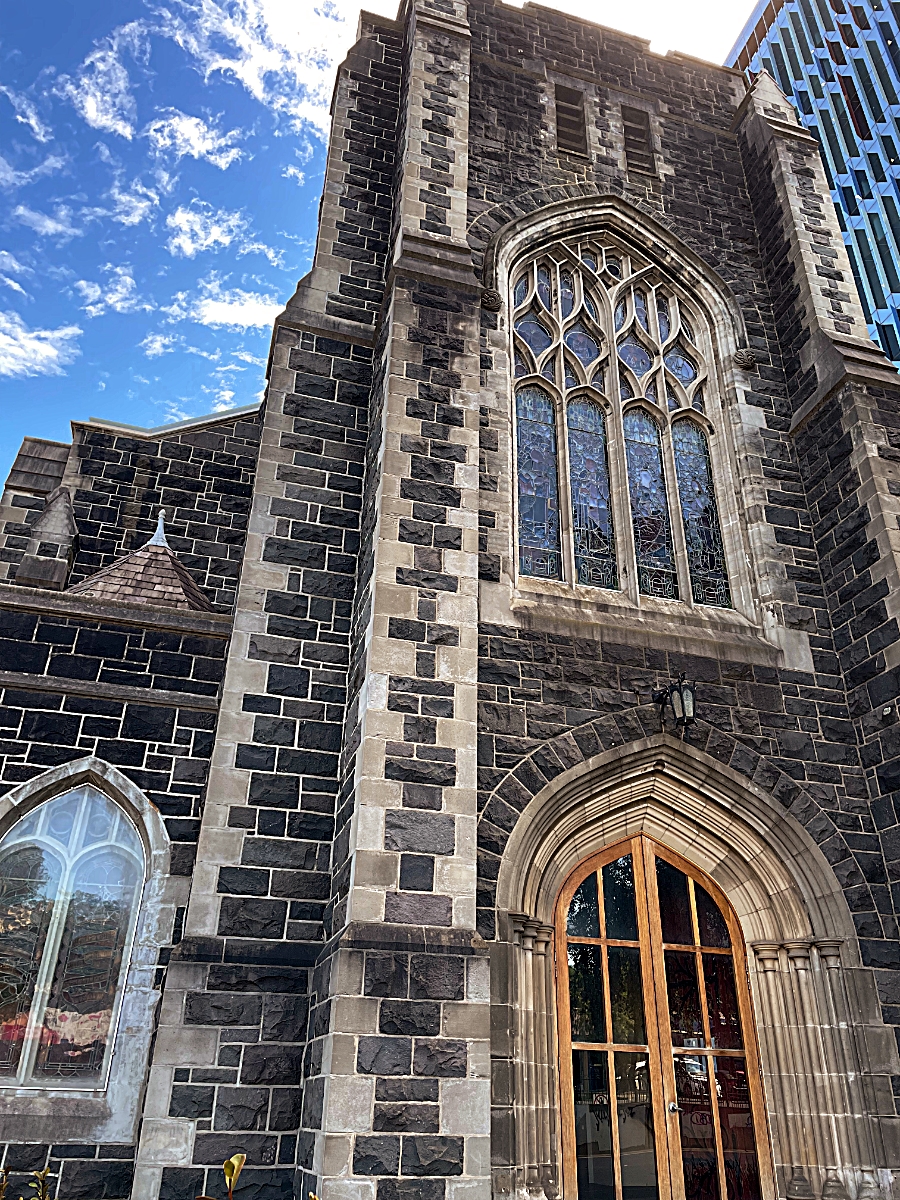 Church exterior showing the tower [photograph by John Maidment (17 January 2023)] 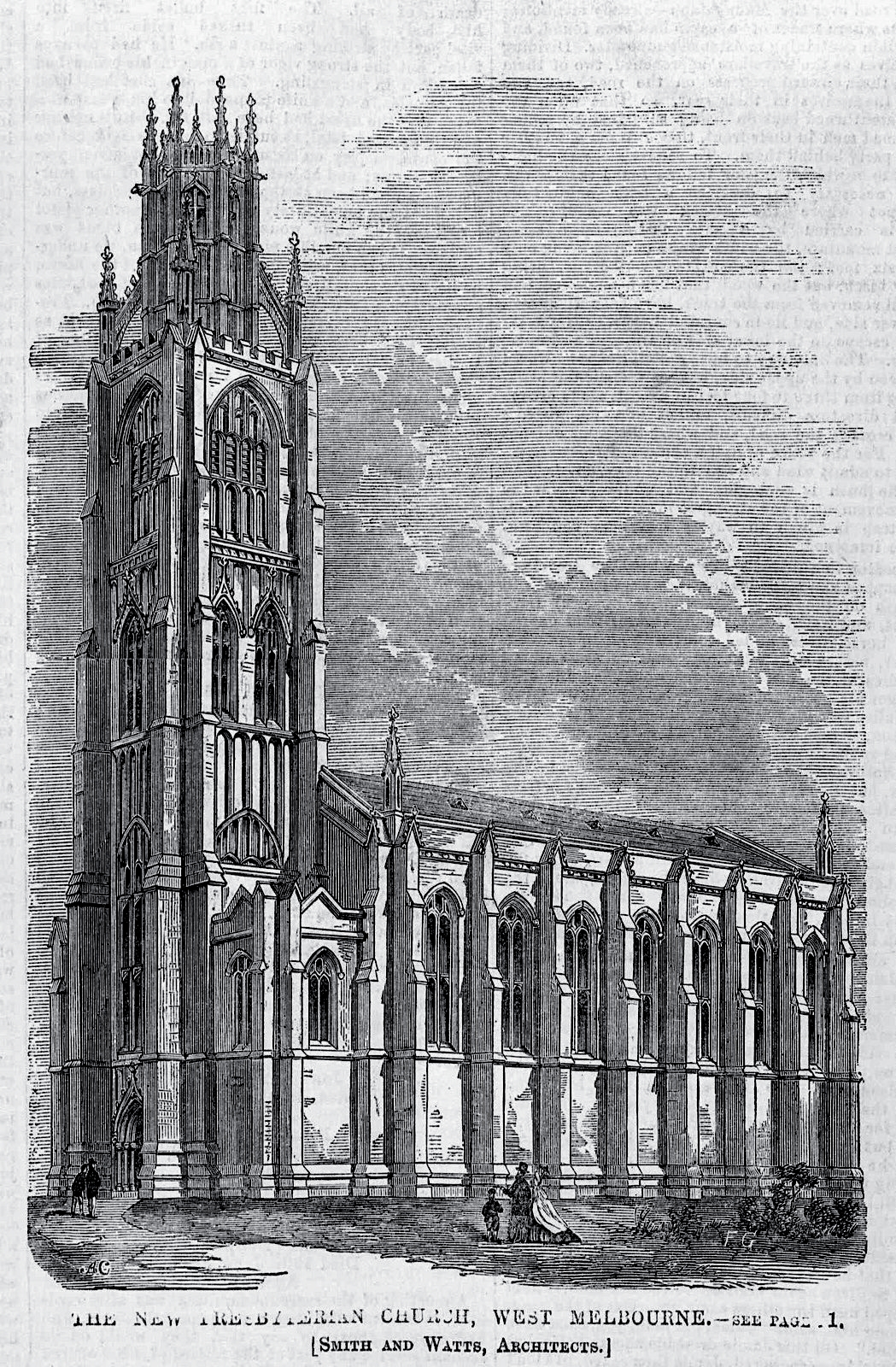 West Melbourne Presbyterian Church – completed design by architects Smith & Watts [A.C. Cooke, engraver, from The Australian News for Home Readers, 27 July 1866] |